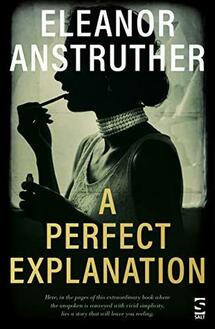A Perfect Explanation by Eleanor Anstruther
Enid has a daughter, Finetta, and another boy. But even with servants and a nanny she finds motherhood gruelling and, when Ian is two, she flees the family home for a Christian Scientist commune in Norfolk, in the belief that her presence is doing the children harm. Two years on she’s ready to pick up the reins again, but her husband wants a divorce, and has placed their younger two with Joan, her sister, and Fagus at boarding school. When Joan reluctantly sends Ian for tea with his mother, Enid won’t let him go.
If only the sisters could sort things out amicably, and put the needs of the children first. But they’ve never been friends and they’re not likely to start now that whoever has Ian has custody of the family fortunes too. Years of wrangling follow, and much dirty linen is aired in court. Is Enid unfit to be a mother, or was her neglect (and eccentric management of Fagus’ illness, throwing away his medicine and tying him to a chair to pray) due to exhaustion, entrapment and grief (her father had also died recently)? How can Joan be the better option, a spinster cohabiting with a dare-not-speak-its-name ‘friend’?
This fascinating story (based on the life of the author’s father) is framed within another, set in 1964, when Finetta and Ian meet for lunch after which he might visit Enid in her Hampstead nursing home, having had no contact for twenty-five years. The writing is enchanting, although some of the description in the early chapters does slow the narrative down.
Eleanor Anstruther’s debut should do well, deservedly so, and there’s a marvellous hook in the blurb to pull readers in. Who wouldn’t want to read about a woman who sold her son to her sister for £500? Although that turns out to be a tiny tail at the end of a very long dog.
I wondered if the ‘sale’ was actually a (metaphorical) gift to Ian, enabling him to cut his ties. Attachment issues must be rife among the upper classes of that generation, taught to be loyal to parents who show them little attention or love. Whereas Ian is able to keep his distance, Finetta is embroiled in a passive-aggressive relationship with her mother, dutifully visiting her every week. She tells us at the start her mother hates her, so is she punishing herself (seemingly having emotionally neglected her own children) or still hoping for love?
Published by Salt, who provided my proof copy, A Perfect Explanation is an extremely engaging story of the bizarre culture of the aristocracy, where love is secondary to money, and the cycle of maternal deprivation across generations is difficult to escape.
Adèle by Leïla Slimani translated by Sam Taylor
While a sexual risk-taker, Adèle trembles at the dark streets of Paris at night. She has married for security, and now she feels trapped. She’s contemptuous of bourgeois banalities and mistreats her only friend. But although we might not like her, we can’t help taking her side.
Her husband’s asexuality (disclosed late in the novel) might partly explain her behaviour, although it’s suggested she’s been promiscuous since her teens. Her mother’s emotional neglect has definitely shaped her character: she wants to be wanted, to be seen. I’d have welcomed more of the psychology, and incorporated into the main story rather than in a splurge towards the end.
With an easy style, Adèle is a page-turner, although it loses some of its verve later on, as her husband’s point of view is introduced, and Adèle loses her freedom to follow her desires. This, the author’s debut, is actually the second of her novels to be translated into English, after the success of Lullaby last year. Thanks to Faber for my review copy.
| You’ll find a feast of identities, including mothering and being mothered, in my short story collection, Becoming Someone. This quote comes from “Rebekah’s Foreskin”. |
























 RSS Feed
RSS Feed





















